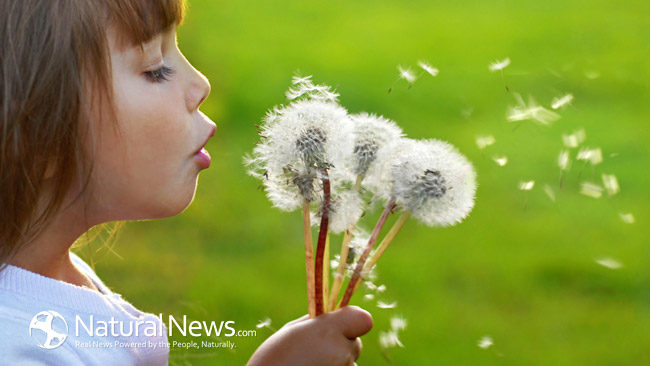, gallThe dandelion is a common plant with a widespread distribution throughout the world. Perhaps that in itself is a hint from Mother Nature that everyone could benefit from the use of this plant. It was first mentioned by Arabian physicians in the 10th and 11th centuries, when it was referred to as Taraxacum, derived from the Greek “taraxos” meaning disorder and the “akos” meaning remedy.
Although many commonly view this plant as a weed, its nutritional and healing abilities are outstanding. Dandelion root is rich in calcium, chlorophyll, iron, magnesium, potassium, phosphorous, silicon and sulphur. Dandelion also contains inulin and mucilage which help to sooth the digestive tract, absorb toxins from foods, and help friendly bacteria to thrive and inhibit unfriendly bacteria.
The leaves are high in calcium and iron and contain copper, manganese, phosphorus, potassium and magnesium. The leaves also contain vitamins A, C, B1, B2, B6, E and K. Dandelion also has more protein per serving than spinach. No matter how you look at this plant, it packs a nutritional punch.
Medicinally dandelion has been used for a variety of purposes such as PMS, high blood pressure, liver disorders, weight loss, cancer, a digestive aid, for calcium deficiencies, yeast infections, and bacterial infections. It is also good for the liver, gall bladder, stomach, pancreas and blood.
A Few Health Benefits of Dandelion
Anemia– Dandelion contains iron, vitamins and proteins that can offer additional support for those with anemia.
Bone Health– Dandelion is rich in calcium ( essential for growth and strength of bones), and is rich is anti oxidants like vitamin C and Luteolin, which protect bones from age related damages due to free radicals, such as weakening and loss in density.
Cancer– Historically, dandelions have been used in Chinese, Arabian and Native American traditional medicine, to treat a variety of diseases including cancer. In recent studies the humble dandelion was shown to have anticancer effects on prostate and breast cancer cells. In fact the root of the dandelion has shown a very potent action against chemo resistant melanoma without any toxicity to healthy cells.
Diabetes– Dandelion juice can help diabetics by stimulating production of insulin from the pancreas. Since it is diuretic in nature, which causes more frequent urination, this in turn helps remove the extra sugar from the body. Moreover, diabetics are prone to renal problems. The diuretic properties of dandelion can help by removing the sugar deposition in the kidneys through urine. Since dandelion juice is bitter to taste, this also effectively lowers sugar levels in the blood, as all bitter substances do.
Digestion-Mild appetite stimulant, also promotes digestion.
Gall Bladder – Dandelion is beneficial for both the gall bladder and liver, as it improves healthy functioning, regulates secretions and protects them from ill effects of oxidants and infections.
Liver – Dandelion has been shown to improve liver function by removing toxins and reestablishing hydration and electrolyte balance. Dandelion also stimulates the liver and promotes digestion.
Skin Care– Dandelion sap, also known as dandelion milk, can be used to treat skin disease that is caused by microbial and fungal infection. The sap is highly alkaline and has insecticidal, germicidal, and fungicidal properties. This sap can be used on itchy areas, ringworm, eczema etc. NOTE: Avoid contact with the eyes.
Urinary Disorders– As previously mentioned dandelion is a diuretic. This helps the body by cleaning deposits of toxic substances in the kidneys and the urinary system. Moreover, its disinfectant properties inhibit microbial growth in the urinary system.
Vitamins & Minerals- Dandelion is a nutritional powerhouse. The leaves contain vitamins A, C, B1, B2, B6, E and K. Minerals such as calcium and iron and contain copper, manganese, phosphorus, potassium and magnesium.
Harvesting Dandelion
Dandelion is consumed as a leafy vegetable, and can be eaten raw, cooked or juiced. The flower heads can be used for wines, in jams, and honeys. Although this marvelous plant is easily found in yards, fields and along roadsides you should only harvest dandelions from a known organic source. Due to pollution levels, use of herbicides and pesticides it just isn’t safe to pick dandelions unless you know for a fact it is an organic source. The root can also be harvested, cleaned, dried and used as well.
With that said, if you have a safe source, keep in mind that dandelion leaves are less bitter, if you harvest them before the flowers appear. The more mature the leaves, the more bitter the taste. If you are harvesting the flowers, be sure to separate the flowers from the bracts (the green part of the plant that holds the flower) or this will add a bitter flavor to whatever you are preparing.
Adding Dandelion to Your Diet
Young dandelion leaves are a welcome addition to a fresh salad, and offer a tangy flavor.
Dandelion leaves can be juiced with fruits and vegetables. Remember mature leaves have a stronger, bitter taste, while baby leaves are milder.
Cook dandelion leaves as you would any fresh greens, with a quick sauté, or steam.
Dandyblend is a wonderful coffee substitute. It contains the dried and powdered roasted roots of dandelion, chicory and beets, and the grains of barley and rye. It is gluten free, caffeine free and tastes delicious.
Buy dried dandelion leaves or dandelion root to create your own recipes.
Resources:
Prescription for Dietary Wellness by Phyllis A. Balch, C.N.C. and James F. Balch M.D.
The Herbal Medicine Maker’s Handbook by James Green
http://www.newworldencyclopedia.org/entry/Dandelion
http://www.globalhealingcenter.com/natural-health/health-benefits-of-dandelion-root/





